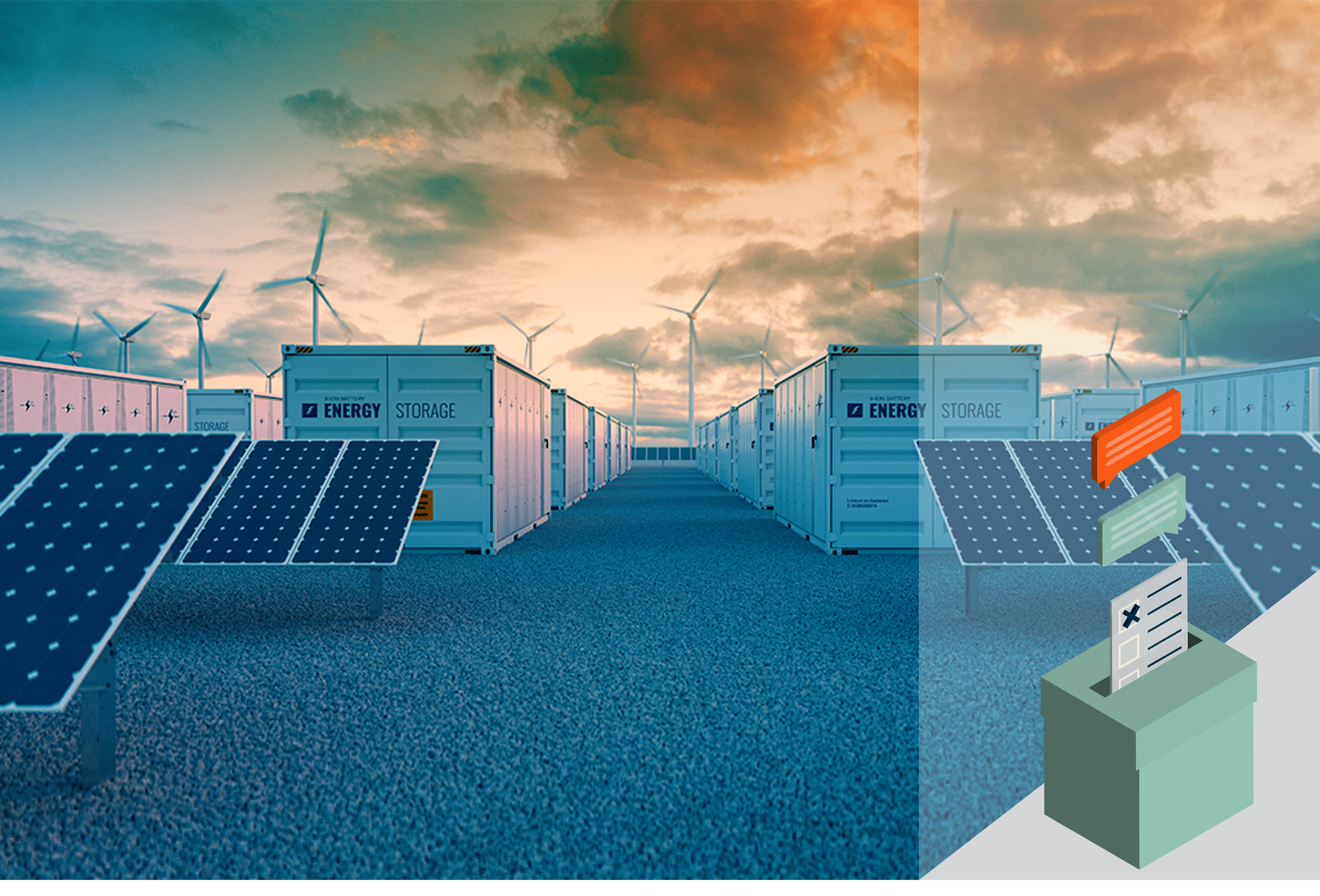The UK general election: what will it mean for UK energy policy?
Published on 25th June 2024
There are many energy challenges for the next government to address, but the rhetoric differs across the political spectrum

The major energy challenges facing the new government of the UK have been well rehearsed and debated in the months leading to the election. There remains the longstanding energy trilemma of energy affordability, security of supply and the achievement of net zero carbon emissions. Behind the trilemma sit complex issues including grid capacity, planning consent, market reform, green subsidies and taxes, supply chain pressures and the need to ensure a just transition to a net zero economy.
The election opinion polls have pointed to a significant Labour majority. It is Labour's energy policy that appears most likely to become the energy policy of the next government and which is therefore the main focus of this article. There are, however, deep differences between the political parties' approaches to address the energy challenges the UK faces. One outcome of the election could be that other parties with currently no or low parliamentary representation may return more MPs, leading to a greater diversity of view and debate in parliament on energy matters during the next parliamentary term.
Labour energy rhetoric has long been upbeat and ambitious. Its paper "Make Britain a Clean Energy Superpower" was filled with ambitious straplines around green growth such as "Bringing Energy Home" and "Backing the Builders not the Blockers". Though its ambition has been significantly scaled back by the well-publicised retreat from its historic commitment to spend £28bn per annum on green measures (the figure is now under £24bn in total, spread across the next parliamentary term), its manifesto energy rhetoric continues to contrast with that of the Conservative government, particularly on net zero. The prime minister, Rishi Sunak, has recently attacked what he called "unaffordable eco-zealotry" and his party has consistently emphasised the need to take a pragmatic approach, openly prioritising energy security and affordability over the achievement of net zero. Labour has avoided ranking the energy trilemma's components in order of priority. Its approach has been to emphasise that its Green Prosperity Plan will deliver against all three, stating that "the only way to cut energy bills for good and deliver energy security is to shift decisively to clean, homegrown low carbon power".
Net zero
Labour and the Conservatives remain committed to the existing legislated date of 2050 to achieve net zero. Conservative net zero policy however is emphasised to be "pragmatic, proportionate and realistic" potentially giving future room for manoeuvre on interim net zero targets. In contrast the Liberal Democrats and the SNP have committed to achieve net zero by 2045 while the Green Party is targeting net zero "more than a decade before 2050" and Plaid Cymru 2035. Reform UK would scrap net zero targets altogether.
Labour's headline near-term net zero objective is to decarbonise the electricity grid by 2030. Several industry commentators (and the Conservatives, who are committed to a 2035 target) have expressed doubt whether that is achievable. They have highlighted the associated challenges of the scale of required renewables deployment and grid upgrade, pressures on supply chain capacity and the potential accelerated threat to oil and gas industry jobs of sticking to a 2030 target.
Recent research by power analytics provider Aurora has highlighted the scale of the challenge. Their report indicated that, on current trajectory and without major policy change and market interventions, electricity grid decarbonisation would not be achieved before 2051. Shadow secretary of state on climate change, Ed Miliband, has stated his party's approach would be to treat this as a "massive project", akin to the 2012 London Olympics, rather than an aspirational target and has recently emphasised that energy workforce planning and skilling would be an important part of the government's role in helping deliver that objective. He will have taken heart from former government chief scientific adviser, Sir Patrick Vallance's, recent endorsement that he considers the 2030 grid decarbonisation target achievable.
Energy costs
At a time when nearly one fifth of UK households are in energy debt, the main political parties have all recognised that the cost of energy is an issue of central importance to the electorate.
Labour aims to address this challenge in a variety of ways. Its central ambition is that its Green Prosperity Plan, including the establishment and funding of GB Energy and the National Wealth Fund, will drive down consumer bills and pass through to customers the value of cheap low carbon electricity, and claims this will help create 650,000 jobs over the next parliamentary term. Additionally it commits to reducing standing charges and implementing tougher regulation "that puts consumers first". Labour has however stopped short of confirming it would not introduce new green levies, has not matched the Conservatives' commitment that annual policy costs and levies on domestic energy bills in each year of the next parliament do not exceed 2023 levels and has not, unlike some other parties, committed to introducing a social energy tariff.
Energy security
Labour supports an ongoing role for oil and gas in the UK energy mix, both for energy security and to help ensure a "phased and responsible transition in the North Sea". In contrast to the Conservatives, Labour would not grant new oil and gas licences but has confirmed it would not revoke existing ones. It would however extend the Energy Profits Levy to the end of the next parliament, increase it from 35% to 38% and remove the "unjustifiably generous" investment allowances. It would maintain strategic reserves of back up gas-fired power stations.
Clean energy as an integral contribution to national security is part of Labour's energy ideology. The party highlights the connection between its Green Prosperity Plan and grid decarbonisation by 2030 commitments with energy and wider national security.
Labour supports the continuation and expansion of nuclear energy for the industry's energy security and low carbon contributions. Sir Keir Starmer was quoted in the press last August as considering those who oppose nuclear power to be "contemptible". The party's manifesto promises to end the "decade of dithering" over nuclear by the Conservative government, get the projects at Hinkley and Sizewell finished and extend the lifetime of existing plants and backs new nuclear including small modular reactors.
There appears little daylight between Labour and Conservative positions on nuclear energy, the latter promising to scale up the industry, quickly approve two new small modular reactor fleets, halve the approval time for new projects and oversee the delivery of the new Wylfa plant.
Investment priorities and renewables deployment
The establishment, funding and operation of GB Energy is Labour's flagship energy policy. Headquartered in Scotland and publicly owned, Labour has committed it will receive £8.3bn of capital funding over the next parliament. It will "partner with industry and trade unions to deliver clean power by co-investing in leading technologies; will help support capital-intensive projects; and will deploy local energy production to benefit communities across the country". While appearing popular with the electorate in polls, the discussion about GB Energy's potential impact has already begun. Will it be a game-changing disruptor or a distraction? Is it big enough to make a real difference? Will its investments unlock private funding that would not otherwise have been available to a project? The detail about its remit and investment models will be eagerly awaited by the energy industry.
In addition, Labour would set up a National Wealth Fund with £7.3bn of funding over the course of the next parliament. Its remit would be to invest alongside the private sector in sustainable infrastructure and projects such as gigafactories, clean steel plants, renewable-ready ports, green hydrogen and energy storage and to speed up the deployment of carbon capture. Its target would be to attract £3 of private investment for every £1 of public investment, seeking to use public money to "crowd in private funding". The headline levels of funding for both GB Energy and the National Wealth Fund contrast markedly with the Conservatives' commitment to invest £1.1bn into their Green Industries Growth Accelerator "to support British manufacturing capabilities, boost supply chains and ensure our energy transition is made in Britain".
The scale of renewables deployment Labour is targeting by 2030 is very ambitious. 5GW of floating wind; 35GW of onshore wind (more than double current capacity); 50GW of solar (more than triple current capacity); 55GW of offshore wind (quadruple current capacity); and 10 GW of green hydrogen. The Green Party, which has committed to press for £40bn of public investment each year in the shift to a green economy, has even greater deployment targets and one of the Liberal Democrats' key headline commitments is for 90% of power to come from renewables by 2030. The Conservatives' ambition is to treble offshore wind capacity and more generally help the UK to become a net exporter of electricity and build more interconnectors to "increase exports, make our energy system more efficient and bring additional revenue to the UK".
Energy efficiency has a prominent position in Labour's manifesto. Its headline promise to invest an extra £6.6bn in energy efficiency measures is similar to the Conservatives' manifesto commitment to spend £6bn on energy efficiency but is spread over the next parliament (rather than the next three years) and is expected to upgrade five million homes (rather than only around one million homes under the Conservatives' plans). Labour's Warm Homes Plan will offer grants and low interest loans to support investment in insulation and other improvements such as solar panels, batteries and low carbon heating. There is also a commitment that private rented homes will have to meet minimum energy efficiency standards by 2030.
Planning and grid
In contrast to its specific eye-catching Green Prosperity Plan commitments, Labour's manifesto pronouncements on planning and grid appear rather more generalised and aspirational, leaving largely unanswered the question as to how the required volume and scale of energy projects can be successfully progressed through the planning system to enable them to be operational by 2030.
In the past Labour has said it will reduce the time renewables projects take in planning "from years to months". Its manifesto promises to "make projects faster and cheaper by slashing red tape" but successive previous administrations have made similar commitments with limited success. Labour has pledged to remove the de facto ban on onshore wind, to reform planning to enable faster delivery of nationally significant infrastructure projects (to include setting out new national policy statements) and ensure the system “meets the needs of a modern economy” by making it easier to build infrastructure including battery plants.
Labour's strapline national grid objective is to "Rewire Britain" but there is as yet little detail as to how this is to be achieved. It commits to work with industry to upgrade the national transmission infrastructure but there are no specific proposals on how to address key grid access, cost and capacity issues. The Conservatives' manifesto commits to cutting waiting times to get a grid connection which it is claimed will deliver an estimated saving of £15 - £25 per household per year out to 2035.
Energy market and regulatory reform
Labour is committed to reform the energy system with tougher regulation that puts consumers first and ensures automatic customer compensation for failure. The Conservatives' reform focus is on introducing more efficient local markets for electricity and they cite expert analysis that estimates this would save £20 - £45 per household per year. Much more complex detail will need to be worked carefully through by the new government but it is notable that Labour manifesto statements on this subject appear rather light in comparison with Liberal Democrat manifesto commitments to decouple electricity and gas prices, eliminate unfair regional differences in domestic energy bills and establish local energy grids.
Osborne Clarke comment
Much of the extensive detail required to deliver headline manifesto policies understandably remains to be populated by the new government.
If the predicted Labour victory occurs, the practical application of the party's optimistic promises on energy will be tested against the constraints imposed by its own budgetary guidelines and the myriad challenges that accompany government. In the first hundred days of the new administration we may expect to see the new government seeking easy headline wins around key manifesto policies, including energy.
As the new parliamentary term develops, we would anticipate a focus on public/private co-investment, new forms of partnership with the private sector to help de-risk projects and attract private sector funding and the engagement and sharing of energy-related benefits with local communities. We await with interest the new Energy Independence Act in which Labour, if elected, has promised to set out a more detailed framework for its energy and climate policies.






